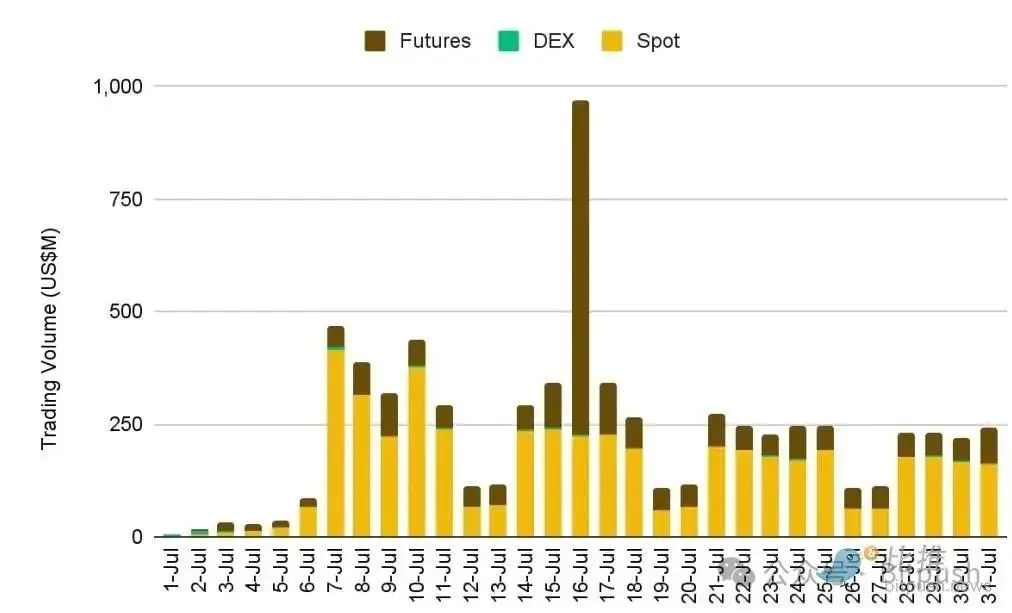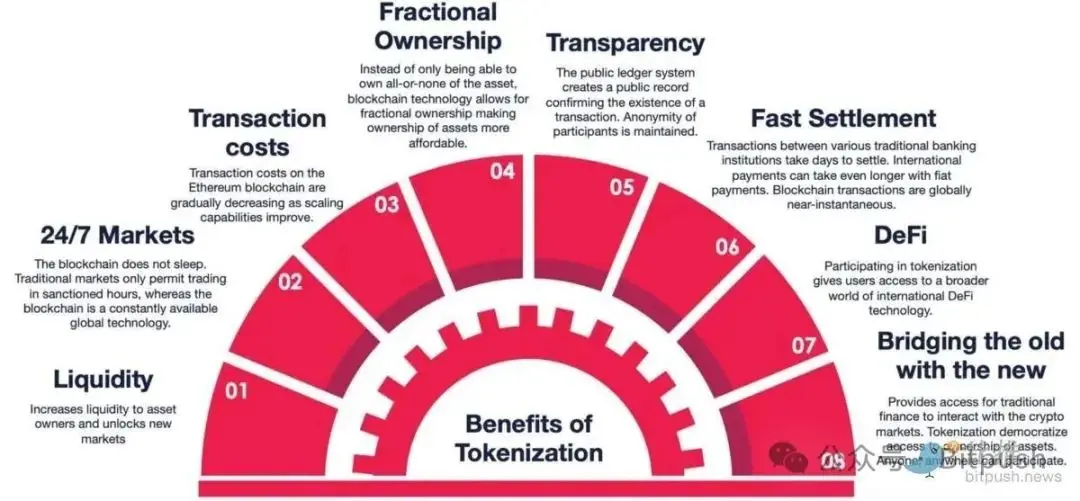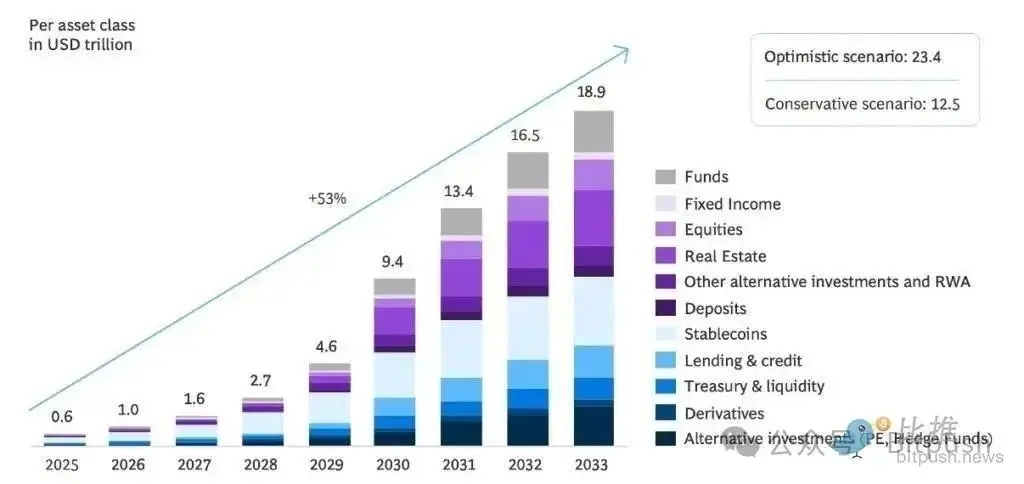At three in the morning, you lie in bed trading Apple stocks on your phone;
Pledging Tesla stocks into a DeFi protocol to borrow stablecoins;
Even using a crypto wallet to buy a fraction of SpaceX equity…
These "impossible tasks" in traditional financial markets are becoming the new trend in the investment market of 2025.
Digital stock tokens blur the lines between cryptocurrency and traditional investments. Crypto exchanges like Kraken and Bybit, along with traditional platforms like Robinhood, are all vying for a foothold in the new battlefield of "stock tokenization."
What is it exactly?
Tokenized stocks are digital representations of real company stocks that exist on a blockchain network rather than a traditional exchange. You can think of them as crypto twins of real stocks—each token typically represents one share (or a fraction) of the company and is fully backed by the actual stocks held in custody.
When you purchase a tokenized Apple stock, a licensed custodian holds the real Apple stock as a reserve, and you receive a blockchain token whose price movement mirrors that of the stock. These digital stock tokens can be traded on cryptocurrency exchanges, integrated with DeFi protocols, and transferred between wallets—features that traditional brokerage accounts cannot offer.
Who are the pioneers?
In 2025, the tokenized stock sector is experiencing explosive growth, with crypto exchanges and traditional brokerages competing for market share.
- Kraken and Bybit launched simultaneously in June 2025, offering over 60 U.S. stock tokens under the brand name "xStocks." They partnered with Swiss company Backed Finance to tokenize blue-chip stocks like Apple, Tesla, and Nvidia, as well as the S&P 500 ETF on the Solana blockchain. KuCoin quickly followed suit, integrating xStocks to provide USDT trading pairs, while Bitget also joined the fray, supporting seamless wallet transfers and DeFi compatibility.
- Robinhood launched over 200 tokenized stocks for its European customers, including private companies like OpenAI and SpaceX. These tokens are based on the Arbitrum blockchain, and the announcement of their release drove Robinhood's stock price to an all-time high.
- eToro expanded its 24/5 stock trading service and announced plans to launch ERC-20 based tokenized stocks on Ethereum, aiming to achieve a true 24/7 market by the end of the year.
- Gemini entered the space by partnering with the FINRA-approved startup Dinari, while CMC Markets hinted at launching tokenized assets through CMC CapX.
Why the explosion?
The maturity of infrastructure is a key factor, as blockchain technology finally reaches a golden moment for financial applications.
Today, high-performance networks like Solana and Ethereum Layer-2 provide ideal infrastructure for financial innovation with lightning-fast transaction speeds and near-zero transaction fees. More importantly, this time it is not a period of wild growth—compliant licensed institutions in crypto-friendly regions like Switzerland and the EU are injecting professionalism and trust into this emerging market.
Behind this transformation is a strong desire among global investors for a "never-closing" trading experience. This investment freedom, which breaks the constraints of time and space, allowed Backed Finance's xStocks platform to achieve $300 million in trading volume within just one month, confirming the market's strong demand for on-chain stock trading.
According to a report from Binance Research, the tokenized stock market saw explosive growth in July, with a total market capitalization reaching $370 million. Although $260 million of this was attributed to the Exodus Movement (EXOD) stock issued through Securitize, excluding this issuance, the remaining market capitalization rose from $16.7 million in June to $53.6 million, a staggering 220% increase in just one month.

The growth in investor demand is also reflected in the number of addresses: the number of blockchain addresses holding tokenized stocks surged to over 90,000 in July, up from just 1,600 in June.
This speed is reminiscent of the early DeFi Summer boom from 2020 to 2021, when the total value locked in DeFi grew from $1 billion to $100 billion in less than two years. This indicates that tokenized stocks may be approaching a significant inflection point, accelerating the transition to hybrid finance.
Advantages: 24/7 market combined with DeFi

Tokenized stocks promise several advantages over traditional stock trading:
- Longer trading hours: They offer 24/5 trading, covering Asian and European time zones, and can even be traded during U.S. market closures.
- Instant settlement: Traditional stocks require T+2 (two business days) for settlement, while blockchain transactions can settle in seconds without intermediaries.
- Fractional ownership: Seamless fractional ownership is made possible through the divisibility of blockchain.
- Lower fees: Thanks to the efficiency of blockchain, Bitget promotes that its users only need to pay gas fees without brokerage commissions.
Tokenized stocks also introduce new investment methods that traditional portfolios cannot achieve:
- DeFi integration: Stock tokens can be used as collateral for DeFi lending, generating new streams of income.
- 24/7 trading: Allows for instant position management across global time zones.
- Portfolio diversification: Enables holding both Bitcoin and tokenized stocks on a single platform.
Mark Greenberg, Global Head of Consumer Business at Kraken, stated that the ultimate goal of tokenization is not just to create "Wall Street on the blockchain," but to achieve a 24/7, autonomous, and globally accessible experience, unlocking new accessibility for investors.
"Packaged" products and hidden risks
Despite the positive market outlook, tokenized stocks also face controversies.
"Non-real stocks" skepticism: Some argue that these tokens are essentially "Contracts for Difference" (CFDs) of the crypto era. As experts say, "It's just a packaging… not real stocks." Token holders rely entirely on the promises of the issuer and custody arrangements—if the trust chain breaks, they cannot directly claim the underlying stocks.
Liquidity risk: During non-trading hours, liquidity may be insufficient. Market makers may find it difficult to hedge stock risks when the underlying market is closed, potentially leading to inflated prices and wider spreads during non-trading hours.
Europe leads, U.S. lags
Due to a more inclusive regulatory framework, Europe is in the lead in this revolution. The EU has no qualified investor restrictions, and the regulatory clarity in places like Switzerland makes it an ideal choice for issuers.
Kraken, Bybit, and KuCoin have all restricted their tokenized stock services to non-U.S. users. The U.S. market remains closed to retail tokenized stock trading, and the SEC may view these tokens as securities that require registration or are limited to qualified investors.
Market forecast: $1 trillion scale by 2033
Although still in its early stages, the adoption of tokenized stocks has shown optimistic signs. Robinhood's stock price surge following the announcement of tokenized stocks reflects market enthusiasm.
Binance Research predicts that if only 1% of the global stock market is tokenized, the market capitalization of tokenized stocks could exceed $1.3 trillion, which would be eight times the peak of the DeFi market. This, in turn, would drive demand for more "complex" DeFi infrastructure, with both reinforcing each other to promote the adoption of blockchain.
BCG data shows that RWA will grow from $600 billion in 2025 to $18.9 trillion by 2033. Even if global stock trading occupies only a small portion, it can bring significant trading volume to tokenized platforms.

Which on-chain ecosystem is leading?
Solana has become the preferred blockchain for tokenized stocks due to its high throughput and low transaction costs. Kraken, Bybit, and Backed Finance have all chosen Solana. Ethereum also maintains a significant position through Layer-2 solutions (like Arbitrum, which powers the Robinhood platform) and its vast ecosystem.
| Platform | Issuer | Status | Number of Stocks/ETFs | Technology | Users | |----------------|----------------|-------------|-----------------------|-------------------------------------|---------------------| | Kraken | xStocks | Live | 60+ | ERC-20 bridged to Solana | Non-U.S. users | | Bybit | xStocks | Live | 60+ | ERC-20 bridged to Solana | Non-U.S. users | | Robinhood | Stock tokens | Pilot | 200+ | Arbitrum L2 | EU residents | | Gemini | via Dinari | Live | Rolling launch | ERC-20 on Base & Arbitrum | EU residents | | Dinari | dShares | Live | 40+ | ERC-20 on Base & Arbitrum | Non-U.S. users | | Backed Finance | xStocks | Live | 60+ | ERC-20 bridged to Solana | Any platform that integrates the technology |
In summary, tokenized stocks are opening Pandora's box, and the boundaries between traditional finance and the crypto world are becoming increasingly blurred. The only suspense now is: how long will it take for Wall Street to catch up with this new era of never-sleeping trading?
免责声明:本文章仅代表作者个人观点,不代表本平台的立场和观点。本文章仅供信息分享,不构成对任何人的任何投资建议。用户与作者之间的任何争议,与本平台无关。如网页中刊载的文章或图片涉及侵权,请提供相关的权利证明和身份证明发送邮件到support@aicoin.com,本平台相关工作人员将会进行核查。




